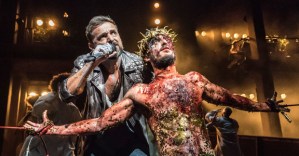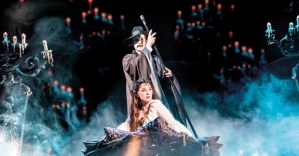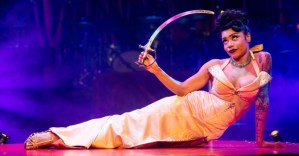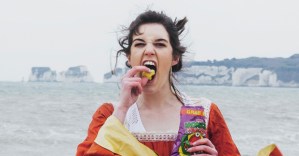Review: Peter Gynt (National Theatre)
James McArdle gives a performance to see in David Hare’s adaptation of Ibsen’s classic
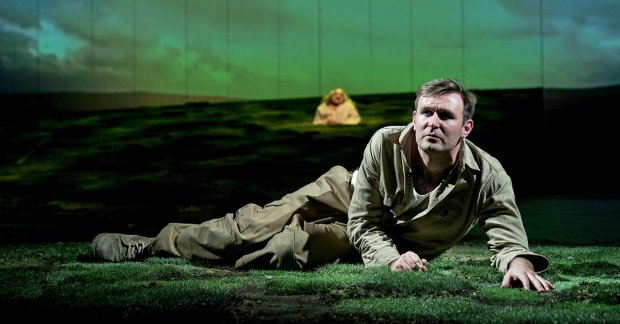
© Manuel Harlan
This is a very odd evening in the theatre. A play by David Hare after Henrik Ibsen that is often funny, often pertinent, sometimes very moving and is glued together by a towering central performance from James McArdle. But it left me wondering whether Ibsen's Peer Gynt, written in 1867 as a poem rather than a play, and ten years before he hit his social realist stride, is performable in these contemporary times.
Despite running at over three hours (with two intervals), this version is never boring (which Peer Gynt can be) but it doesn't ever quite resolve the mad veering between fantasy and reality that characterises the original, and in fact introduces some discordant key changes all of its own.
It starts rather brilliantly. Peter, a doughty Scotsman returns home from the war via a door in the sky of Richard Hudson's set, to regale his mother (a spirited, sharp-edged Ann Louise Ross) with tales of valour, which turn out to be plucked wholesale from films he has seen. McArdle fills the space with charm and energy, sucking the audience into his confidence, while simultaneously setting up the themes that drive the evening: Peter's desire to be exceptional, his belief that individual fulfilment is the goal of life, whatever the cost and his will to shape his own narrative.
"People don't have lives anymore. They have stories," he announces, a line that signals Hare's interest in the way that Peer Gynt's obsession with self perfectly reflects our superficial, self-obsessed and crazy days.
But the play spins all over the place as it pursues this thought, following Gynt on his travels into the Troll kingdom ("I never knew trolls were so suburban"), into massive riches based on his arms dealing, newspapers and golf courses, into foreign lands where he is a guru and a false prophet and finally back to confront his own failure and the inevitability of death. Hudson's design copes with these changes with heavy use of projections and an over-obvious jollity; Jonathan Kent's direction lacks its usual subtlety. It's almost as if everyone panicked about bringing the play to life. At times (the arrival of some rhinestone cowgirls, a candlelit dinner for some mask-wearing Trolls) the production feels over-emphatic and loud.
At other moments, Hare's instincts for a fierce political satire shine through. The scene where Gynt is crowned Emperor of Self and meets a lot of politicians in the grip of a longing for a past where "the passports were blue" and "Everyone was white!" is sharp, especially since the deluded narcissists also include a writer who can't write about any character but himself. But too often, just as Hare's imagination takes wing, Ibsen's fantastical structure pulls him back. At others, Hare's desire for topicality pinions Ibsen's tendency to the universal.
Yet there are times when the two playwrights collide to powerful effect. The scene where Peter comforts his dying mother shows this compulsive liar in a gentler light; his story-telling is a gift not a curse. When Oliver Ford Davies arrives on the scene as The Button Moulder, sent to catch Peter's soul, a thoughtful calm descends as Peter discovers the difference between self-discovery and self-improvement.
The jokes keep coming, but McArdle finds his way to the truth of the play. It is an astonishingly good performance, full of detail as he captures Peter's shifting moods. He's not afraid to make the ultimate anti-hero unattractive and unkind, but he never loses sight of the tragic longing at his heart, the desire to matter. He's the main reason to see the play.




